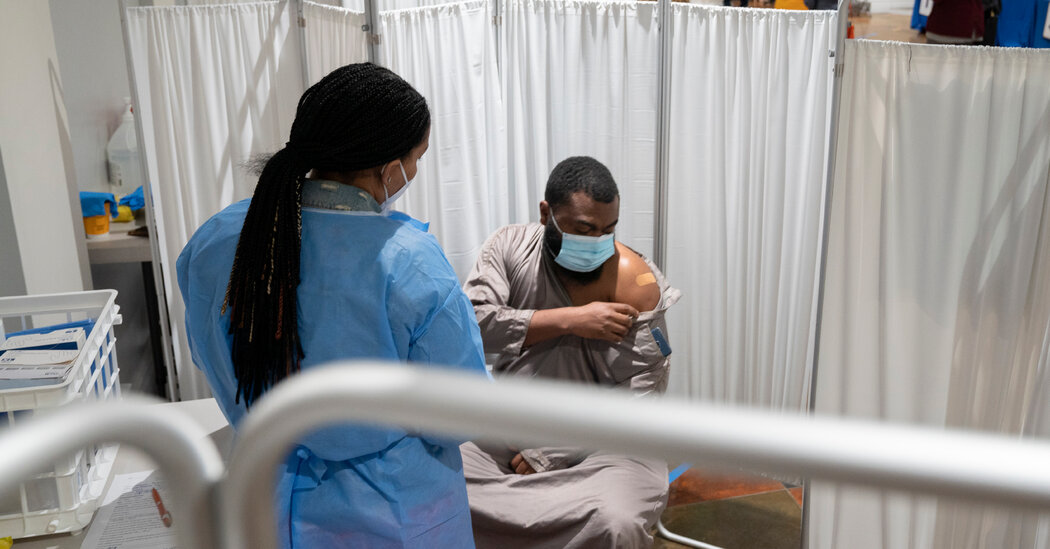
Top U.S. health officials sought to reassure Americans on Sunday that the 10-day pause in the use of Johnson & Johnson’s vaccine showed how well safety monitoring for the Covid-19 vaccines worked, and should not add to the hesitancy to get shots among some Americans.
“What we’re going to see, and we’ll probably see it soon, is that people will realize that we take safety very seriously,” said Dr. Anthony S. Fauci, the president’s top medical adviser for the coronavirus, during an interview on the ABC News program, “This Week.”
“We’re out there trying to combat the degree of vaccine hesitancy that still is out there,” Dr. Fauci said. “And one of the real reasons why people have hesitancy is concern about the safety of the vaccine.”
What You Need to Know About the Johnson & Johnson Vaccine Pause in the U.S.
-
- On April 23, a Centers for Disease Control and Prevention panel of advisers voted to recommend lifting a pause on the Johnson & Johnson Covid vaccine and adding a label about an exceedingly uncommon but potentially dangerous blood clotting disorder.
- Federal health officials are expected to formally recommend that states lift the pause.
- Administration of the vaccine ground to a halt recently after reports emerged of a rare blood clotting disorder in six women who had received the vaccine.
- The overall risk of developing the disorder is extremely low. Women between 30 and 39 appear to be at greatest risk, with 11.8 cases per million doses given. There have been seven cases per million doses among women between 18 and 49.
- Nearly eight million doses of the vaccine have now been administered. Among men and women who are 50 or over, there has been less than one case per million doses.
- Johnson & Johnson had also decided to delay the rollout of its vaccine in Europe amid similar concerns, but it later decided to resume its campaign after the European Union’s drug regulator said a warning label should be added. South Africa, devastated by a more contagious virus variant that emerged there, also suspended use of the vaccine but later moved forward with it.
On Friday, federal officials lifted a pause that had been recommended on April 13 for the use of the Johnson & Johnson vaccine because of a few cases of a rare blood clotting disorder that had occurred mainly among younger women. By Friday, experts had identified 15 cases, including three deaths, stemming from the extremely unusual clotting issue. A warning about the risk for the disorder will be included for the company’s product.
Public health experts have raised concerns that the Johnson & Johnson pause was particularly worrisome because many states were relying on the one-dose shot to expand vaccinations into harder-to-reach rural areas, and for those who were homebound, homeless and on college campuses.
Some officials also worried that the pause would dampen vaccine rates that are already falling in the country. The government is aiming to vaccinate most adult Americans by the summer.
On NBC’s program “Meet the Press,” Dr. Francis Collins, director of the National Institutes of Health, compared the risk of a blood clot from the vaccine — less than 1 in 500,000 — to the danger of aspirin causing significant bleeding in the intestines among people who regularly take aspirin.
“We’re talking about something about a thousand times less likely to happen,” Dr. Collins said. “But we Americans are not that good at this kind of risk calculation.”
Many states have already announced that they would resume use of the Johnson & Johnson vaccine. Nearly 8 million people had received it before the pause, and about 10 million doses were sitting on shelves around the country waiting to be dispensed.
Overall, more than 50 percent of adult Americans have received at least one shot among the three vaccines available, Dr. Fauci said.
Both Dr. Fauci and Dr. Collins said it was crucial for a high percentage of Americans to be vaccinated to end the pandemic. “The more people you get vaccinated, the more people you protect,” Dr. Fauci said. “When you get a critical number of people vaccinated, you really have a blanket of protection over the entire community.”
Dr. Collins said scientists did not know the exact percentage of people with immunity, either from the vaccine or from antibodies generated from surviving a bout with the virus, that would be needed to reach herd immunity, especially as the coronavirus mutates into new variants that can be more infectious.
“But it’s up there around 70, 85 percent,” he said. “And we’re not there yet.”
He said that being fully vaccinated was freeing.
“My wife and I were able to invite another couple to come to our house to dinner and take off our masks because they were immunized as well and have a normal conversation and hug each other at the end of the evening,” Dr. Collins said. “That was so liberating. If you’re not vaccinated, you’re missing out on that chance to lift that blanket of fear that’s been there.”
Asked about calls for lessening restrictions for mask-wearing outdoors, Dr. Fauci said the Centers for Disease Control and Prevention could soon revise its recommendations. “I think it’s pretty common sense now that outdoor risk is really, really quite low,” Dr. Fauci said. “I mean, if you are a vaccinated person, wearing a mask outdoors, obviously, the risk is minuscule.”
